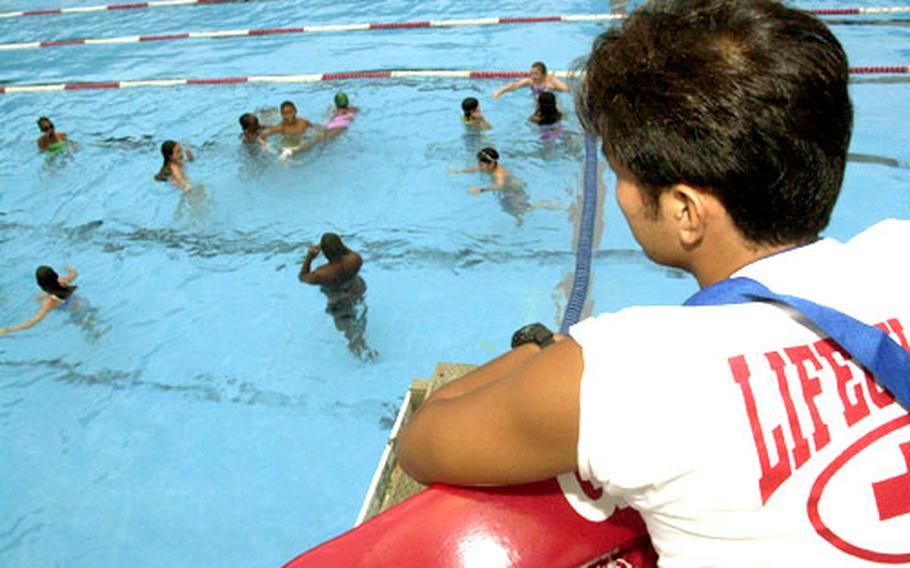
People who work outdoors, including lifeguard Kanazuka Takeshi at the Yokosuka Naval Base pool, need to be vigilant in applying SPF 30 sunscreen to avoid skin damage that could lead to skin cancer. The children might have entered the pool wearing sunscreen, but they’ll need to reapply after toweling off. (Jim Schulz / Stars and Stripes)
SASEBO NAVAL BASE, Japan — The summer’s most intense days of the sun’s harmful ultraviolet rays are about to dominate Pacific weather forecasts.
Despite the broiling days ahead, some folks will remain outdoors for long hours at pools, golf courses, hiking trails and fishing holes; they should heed the advice of healthcare professionals.
Simply being outside on sunny days can contribute to skin cancer.
The three most common forms of skin cancer — basal cell, squamous cell and melanoma — are on the rise among Americans, according to the American Academy of Dermatology.
Melanoma is the deadliest form; one out of every 71 people will contract it. Twenty years ago, it was one in 150 people.
Fortunately, there are effective ways to diminish the sun’s unhealthy effects.
Petty Officer 3rd Class Anna Pesqueira, a hospital corpsman at Sasebo’s Branch Medical Clinic, promotes skin-cancer awareness, and educates people about preventative measures.
“One way to prevent sun exposure, of course, is with sunscreen with an SPF (sun protection factor) of up to 30,” she said. “And people should wear wide- brimmed hats, and not just baseball caps because they don’t cover the back of your head.”
Despite the summer heat, Pesqueira recommends wearing long sleeves and full-length trousers because they cover more skin surface area.
“Many people don’t realize that you can also be affected by the sun on cloudy, overcast days. Just because you can see it,” she said, “doesn’t mean it’s not there.”
People out in the sun, she said, should also wear sunglasses: “You also want to protect your eyes, as well as your skin.”
Most skin cancer, which is more prevalent among fair- skinned people, can be effectively treated, said Cmdr. Elise Gordon, officer in charge of the Sasebo’s clinic’s family practice department.
It is estimated that 1 million new cases will be diagnosed with basal cell carcinoma among Americans in 2003, the news reports stated.
Gordon said the basal cell variety frequently occurs on sun-exposed skin of the face, neck and upper body. Most often it appears as an enlarging bump that bleeds easily if rubbed.
“We get our fair share of those. Every couple of weeks we have someone in here having something removed,” she said.
Squamous cell carcinoma, she said, is usually scaly or tender red bumps on sun-exposed skin. This type, depending on how deep the tumor is, can be invasive.
Melanoma is the most serious form of sun-related skin cancer, Gordon said, because it is invasive, and can spread to other organs in the body. If treated early, thin melanomas are curable with simple surgery. If the diagnosis is delayed, melanomas can rapidly spread.
“This is the scary one. This is the one that can kill you,” she said.
A brown or black spot on the skin characterizes melanoma that changes in size, shape or color over weeks to months, she added.
Even sunburns endured as a youth are risk factors for melanoma, Gordon said.
Sunscreens play a vital role in keeping skin safe from the sun’s harmful wavelengths.
Pesqueira said sunscreens labeled with a SPF higher than 30 are really no more effective. “SPF 30 is all you need. The others are no more effective. They are labeled just for the sale value.”
These days, sunscreens labeled “broad spectrum UVA protection” with an SPF of 30 or greater are recommended — nothing more, and nothing less.
So, you’re at the beach and you’ve covered your body with a good coat of SPF 30 sunscreen. You are good to go for the entire day, right? Well, not really.
Pesqueira explains: “If you’ve had any rubbing or sweating at a sports activity, or you’ve been at the beach and swimming and you towel dried, don’t forget that the sunscreen is coming off, and you need to reapply. You really should reapply every couple of hours.”